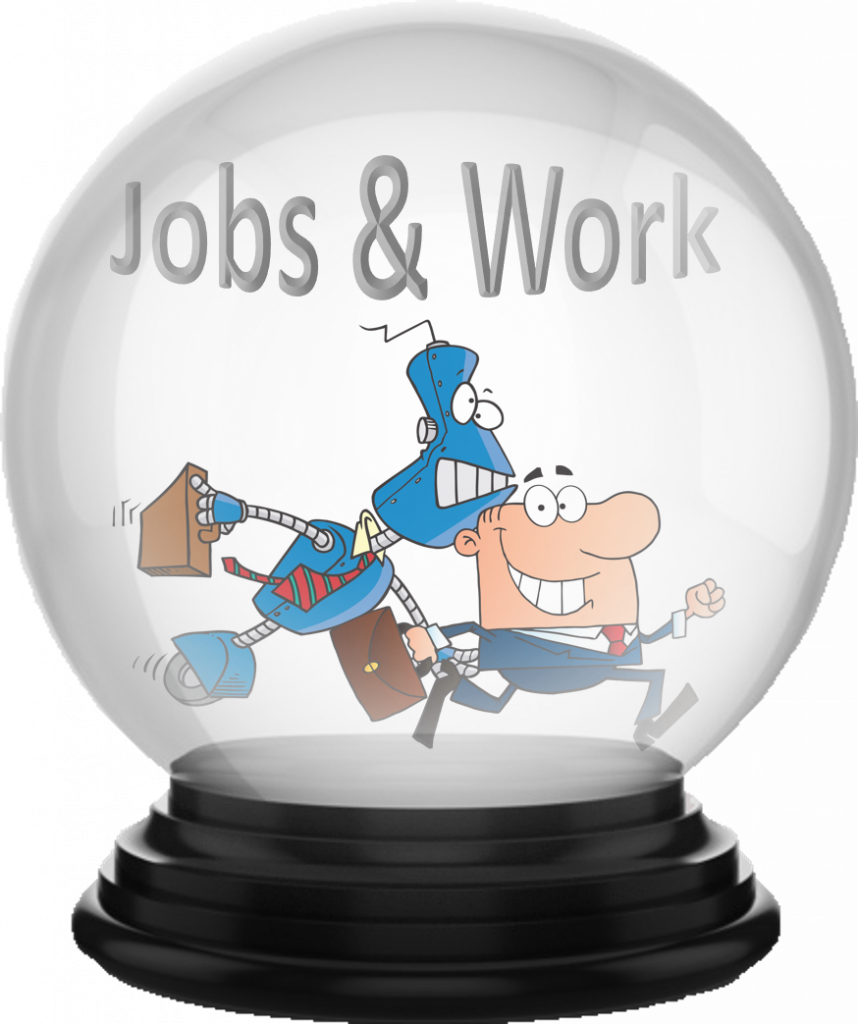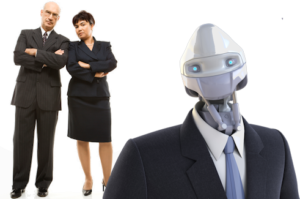Prediction season generally begins in December. It’s that wonderful time of the year when brave souls stare into their crystal balls and prognosticate about what lies in the future. This article will be the first in a series covering predictions in a broad array of areas. Few subjects are of greater importance to the human race than jobs sustainability and the future of work. L. Rafael Reif, president of the Massachusetts Institute of Technology, reports, “In a recent Pew study, 72 percent of Americans report feeling either worried or very worried about ‘a future where robots and computers can do many human jobs.’ Seventy-six percent believe that economic inequality will grow worse in such a future.”[1]
Technology and Jobs
Reif briefly summarizes the current debate about jobs sustainability and the future of work. “Every past technology wave ultimately produced more jobs than it destroyed and delivered important gains,” he explains, “from higher living standards and life expectancy to productivity and economic growth. Yet many fear that this time the change may be so fast and so vast, and its impact so uneven and disruptive, that it may threaten not only individual livelihoods, but the stability of society itself.” Dire predictions about the future capture a lot more headlines than positive predictions. Reif notes, however, “This outcome is not inevitable — and the future is in our hands. Indeed, deliberate, coordinated action is what smoothed such transitions in the past. If we want the advance of technology to benefit everyone, however, we need to take action right away: We must proactively and thoughtfully reinvent the future of work.”
The dire prediction of Andrew Ng (@AndrewYNg), founder of Coursera, formerly the head of AI for Chinese search giant Baidu and, before that, creator of Google’s deep-learning Brain project, is “that artificial intelligence is coming for plenty of jobs.”[2] Fast Future futurists, Rohit Talwar (@fastfuture), Steve Wells (@informingchoice), and Alexandra Whittington (@alexandra4casts), note, “Forecasts vary of how many jobs could be replaced or created by AI and sister technologies such as blockchain, big data, hyperconnectivity and the internet of things.”[2] They are nevertheless confident enough about the future to predict, “The new jobs will require advanced skills and ‘digital mindsets’, and the transition will be dramatic and painful.”
Talwar, Wells, and Whittington believe society needs to be proactive in addressing the future of work. They assert, “Governments, businesses, and civil society will need to rethink the assumptions and mechanisms that underpin our world.” Ng insists society needs to go beyond rethinking assumptions and suggests it enacts “an updated version of the New Deal.” That Depression-era program, NG notes, “invested in, among other things, getting unemployed Americans back to work” and it paid “displaced workers to learn new job skills.” Reif agrees retraining and reskilling will play important roles in the future. “CEOs across many sectors face a painful quandary,” he writes. “They have to lay off people whose jobs have disappeared, while they have job openings they can’t fill because they can’t find people with the right training and skills. This mismatch is bad for everyone: Lives are derailed, families and communities damaged, business opportunities lost.”
Prediction: The Future won’t be so Bad
I’m an optimist by disposition; however, I must admit the current political dysfunction is testing my limits. If we are going to create a brighter future and avoid social catastrophes resulting from massive unemployment, stakeholders in every area must collaborate to develop a strategy. Reif asserts, “If educational institutions, employers, and employees imagine and refine a solution together, continuous uptraining could become a crucial tool to help individuals adapt to relentless change. Reinventing the future of work needs to be a whole-society effort — and finding long-term solutions will require ideas and initiative from every quarter.” I wholeheartedly agree. If we can learn to collaborate on solutions, the future won’t be so bad. Reif asks a series of questions addressed to various parts of society. If we can answer these questions positively, he believes the future will be brighter not darker. The questions are:
- Could educators make sure that every graduate is computationally literate?
- Could institutions like MIT do better at guiding students to balance efficiency with other human values in choosing the problems they work on and how they design solutions?
- Could workers help develop automating technologies, to create complementary machines that make humans more effective and efficient instead of obsolete?
- Could corporations use some profits achieved through automation to invest in developing those whose jobs automation has erased?
- Could unions help shape more relevant and accessible apprenticeship and uptraining programs?
- Could government develop educational incentives that would motivate firms to locate in hard-hit regions?
Author Tim O’Reilly (@timoreilly) believes we need to develop people-focused strategies if we are going to achieve a brighter future.[4] He harbors no fears about there not being plenty of work for humans to do in the years ahead. He does, however, worry about growing economic inequality. He explains:
“Nick Hanauer, Amazon’s first non-family investor and tireless advocate for a more equitable economy, said: ‘Prosperity in human societies is best understood as the accumulation of solutions to human problems. We won’t run out of work until we run out of problems.’ That is one of three reasons why we will never run out of jobs. The second is explained by what Clayton Christensen, Harvard business professor, called ‘the law of conservation of attractive profits’. Once one thing becomes commoditized, something else becomes valuable. I have seen how the rise of open source software and the open protocols of the internet have not led to the end of the software industry but to the rise of new business empires based on Big Data and collective intelligence. This same dynamic is at work in our creative economy. When the mechanical spinning and weaving machines of the industrial revolution put hand spinners and weavers out of work, cloth became cheaper. We made it valuable again with fashion, and brought that fashion not just to the rich but to everyone. Millions of people worked designing, marketing, selling and distributing the results.”
Perhaps the most profound point O’Reilly makes is that society needs to stop believing “human workers are a cost to be eliminated.” He adds, “Technology is eliminating jobs because that is what we are asking it to do. If we want a better world, it is time to start asking for something else.” We are perhaps starting to see a shift in this direction with proposals like Ng’s suggested New Deal. Another sign of change is Google’s billion dollar investment “over the next five years in nonprofit organizations helping people adjust to the changing nature of work.”[5]
Summary
To be honest, no one really knows how the future of work is going to play out. The good news is that more and more people from every economic sector are starting to discuss potential ramifications of a future that robs humans of meaningful work. Back in 1759, Voltaire wrote, “Work saves us from three great evils: boredom, vice, and need.” That statement has maintained it veracity over the centuries. My prediction is that it will continue to prove true in the years ahead.
Footnote
[1] L. Rafael Reif, “Transformative automation is coming. The impact is up to us,” The Boston Globe, 10 November 2017.
[2] Rachel Metz, “Andrew Ng Wants a New ‘New Deal’ to Combat Job Automation,” MIT Technology Review, 7 November 2017.
[3] Rohit Talwar, Steve Wells, and Alexandra Whittington, “Digital transformation will be dramatic and painful,” Financial Times, 26 October 2017.
[4] Tim O’Reilly, “People power, not robots, will overcome humanity’s challenges,” Financial Times, 19 October 2017.
[5] Jessica Guynn, “Google to give $1 billion to nonprofits and help Americans get jobs in the new economy,” USA Today, 12 October 2017.




